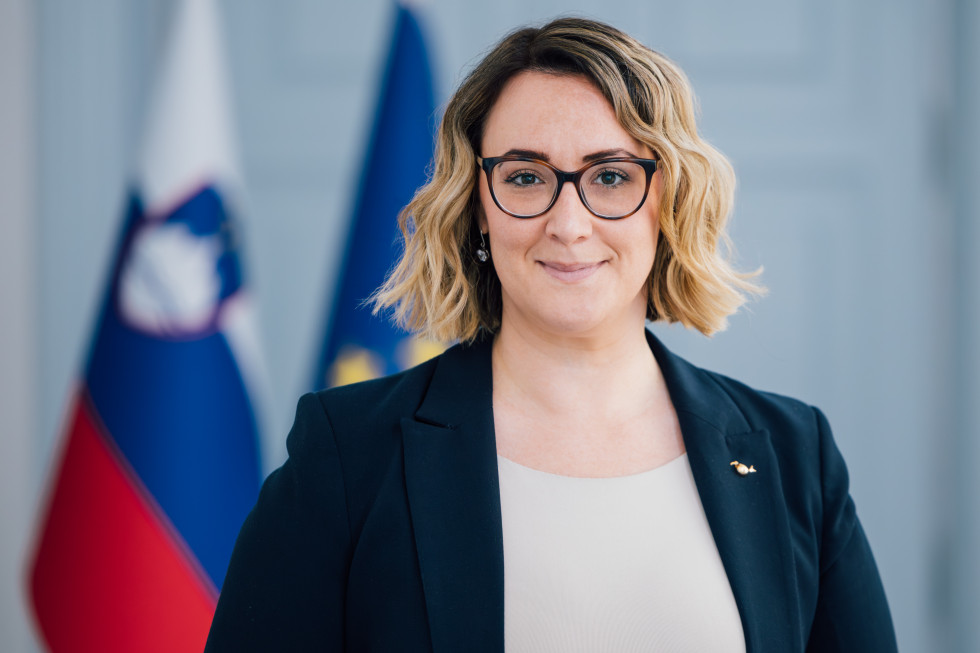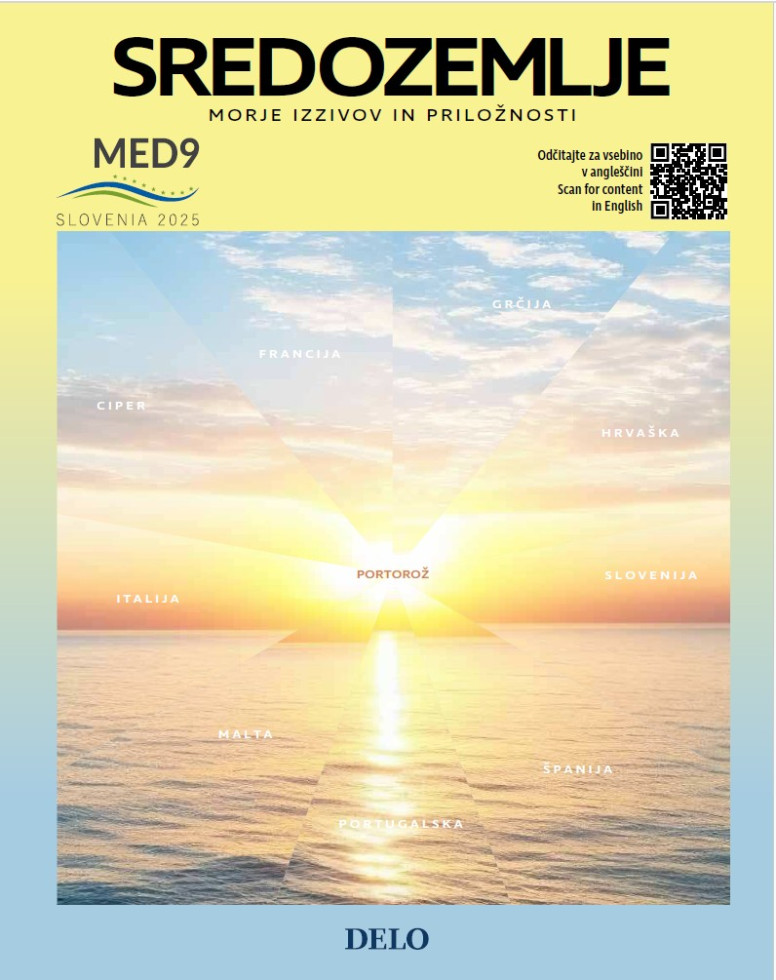Slovenia recognised as a constructive and active country
The MED7 group was established in 2013 as an informal grouping of southern and Mediterranean EU Member States, initiated by Spain and Cyprus. The group held its first meeting in Brussels in 2013 at the level of foreign ministers. At the 8th MED7 Summit in Athens in September 2021, the group's membership was extended to include Slovenia and Croatia, resulting in the name being changed to MED9. Since 2016, meetings have been held at a prime ministerial level. This year's summit will be hosted by Prime Minister Robert Golob in Portorož in October, while next year's summit will take place in neighbouring Croatia.
“EU Member States form various informal alliances to address specific issues of common concern. These alliances are often formed on a regional basis. Slovenia has several anchor points: Central European, Alpine and Mediterranean. Slovenia first attempted to join the MED7 group as early as 2014, but this effort did not materialise," replied Anže Logar, the Foreign Minister in Janez Janša's third government, when asked what had led the previous government to join the MED7 group.
Slovenia has several anchor points: Central European, Alpine and Mediterranean. Slovenia first attempted to join the MED7 group as early as 2014, but this effort did not materialise.
Anže Logar
Anže Logar explained that the original reasons for establishing the MED7 were primarily related to the negotiations on the EU's Multiannual Financial Framework and the distribution of European funds. He added that the group's format allowed for an exchange of views on various Mediterranean challenges, as well as other security and political issues, ranging from the situation in the Middle East and the Southern Mediterranean to migration issues, energy, food security and environmental challenges. "It is good that Slovenia can discuss and decide on all these issues on an equal footing with other European Mediterranean countries," he said.

"Slovenia's membership of the MED9 group has significantly strengthened and intensified its political and practical engagement in the Mediterranean," said Neva Grašič, State Secretary at the Ministry of Foreign Affairs.
Continuity from Janša to Golob
Logar also emphasised that, until its most recent expansion, the MED7 group had been an informal, closed club of countries. "The inclusion of Slovenia and Croatia at the 2021 summit was not simply a matter of joining. Rather, it was the outcome of successful diplomatic efforts, in which the Heads of State and Government of the MED7 countries recognised the added value that Slovenia and Croatia would bring to the group. They unanimously agreed to expand," Logar recalled.
"The previous government deserves credit for securing Slovenia's membership in the MED9 group and for its participation in the enlargement summit in Athens in 2021. The current government has had more than three years to create and take advantage the opportunities offered by membership," Logar said when asked what Slovenia gained from its membership of the group. He added that Robert Golob's government took over the Presidency of the MED9 group this year, but it remains to be seen to what extent it will make use of this opportunity. "I hope to the greatest extent possible," said Logar, "because we will discuss and negotiate the EU's Multiannual Financial Framework, where Slovenia needs allies."
"The upcoming budget will face major challenges. On the one hand, this is due to enlargement plans and the associated need to reform both the functioning and policies of the EU. On the other hand, we are facing serious security threats and the need to strengthen the defence capabilities of Member States – a fact that is somewhat underestimated, given the origin of these threats in some parts of the Mediterranean," he warned.
The State Secretary at the Ministry of Foreign and European Affairs, Neva Grašič, firmly believes that, alongside Slovenia's non-permanent membership of the UN Security Council, this year's Presidency of the informal MED9 group is the biggest foreign policy event for Slovenia.
Alongside Slovenia's non-permanent membership of the UN Security Council, this year's Presidency of the informal MED9 group is certainly the biggest foreign policy event for Slovenia.
Neva Grašič
In her opinion, there are several reasons for this assessment. "Slovenia's Presidency of the MED9 group is clear evidence of its reputation and the importance of its foreign policy activities in the Mediterranean region, which is undoubtedly linked also to the role Slovenia plays as a non-permanent member of the UN Security Council," she explained as the first reason. A second is that the MED9 group represents a third of all EU Member States, including two of its founding EU Member States, Italy and France. "We can say that this is a group that represents a kind of arc of the EU's development and its members are highly aware that we are only strong when we work together in the areas that unite us."
A distinctly pro-European group
Slovenia's Presidency of the MED9 group is taking place in a landmark year for the Mediterranean, marking the 30th anniversary of the Barcelona Process, which played a pivotal role in shaping relations between the EU and Mediterranean countries, and in promoting economic development, political reforms and intercultural dialogue, State Secretary Neva Grašič emphasised. She believes that the Barcelona Process's achievements continue to provide a solid foundation for continued cooperation among Mediterranean countries. One of its outcomes was the establishment of the Union for the Mediterranean within which the founding of the Euro-Mediterranean University (EMUNI) as one of its six flagship projects holds particular significance for Slovenia.
"Slovenia is recognised in the Mediterranean as a constructive and active country, as well as an advocate for the empowerment of young people, women and vulnerable groups, for mobility and higher education, and for cooperation and solidarity in mitigating the effects of climate change, including as a strong supporter of food security and water management," replied Neva Grašič to the question of what Slovenia has achieved since joining the MED9 group. Slovenia's inclusion in the MED9 group is the result of long-standing efforts to increase its presence in the Mediterranean, strengthen ties with Mediterranean Member States and raise the profile of Slovenia's Mediterranean dimension.
According to Grašič, Slovenia's membership of the MED9 group has significantly strengthened and intensified its political and practical engagement in the Mediterranean. This has given Slovenia valuable insight into the region's dynamics, as well as a more active role in its relations with southern neighbours.
The MED9 group was established to enable informal consultations, the exchange of views, and the coordination of positions on various EU agenda items and Mediterranean-related issues, on which the Member States hold similar views. The purpose of the MED9 group is to act collectively with a unified, stronger voice at EU meetings. "This is a distinctly pro-European group with a specific focus on issues tied to the Mediterranean dimension of the EU," explained Nina Skočajić Juvan, the National Coordinator for the Union for the Mediterranean at the Ministry of Foreign and European Affairs.
Initially, the main topics were migration and the challenges facing the southern neighbourhood. Over time, however, other EU topics have come to the fore, such as resolving the Eurozone crisis, the future of the European Monetary Union, the Multiannual Financial Framework, the fund for recovery, growth and employment, Brexit, terrorism, energy, economic growth, employment, the Middle East peace process, the European Neighbourhood Policy and climate change.
"The MED9 group's key achievements include identifying specific issues on which members have been able to align their positions, with the aim of presenting a united front and acting together. The MED9 group has taken several concrete steps towards greater solidarity and cooperation in areas such as migration, regional security, climate change and economic development. It has been instrumental in advocating for EU reforms that provide greater support for southern European countries in tackling common challenges," said Juvan, listing the group's achievements.
The Mediterranean dimension also plays a key role in the revised foreign policy strategy – Slovenia is pursuing an active Mediterranean foreign policy.
Nina Skočajić Juvan
In its strategic foreign policy documents, Slovenia defines itself as a Mediterranean country. "Under the current government, Slovenia's engagement with the Mediterranean and Mediterranean cooperation fora has intensified significantly, and is among the top priorities. The Mediterranean dimension also plays a key role in the revised foreign policy strategy from December 2024, where Slovenia pursues an active Mediterranean foreign policy based on blue and green economies, food and energy security, geographical assets, intercultural dialogue, migration issues and strengthening resilience," emphasised Nina Skočajić Juvan.
All eyes on Gaza
The MED9 Leaders' Summit aims to facilitate coordination at the highest political level ahead of the European Council's regular October meeting. At the meeting, leaders will discuss the pressing foreign policy and security situation, including the developments in the Mediterranean and the Middle East. They will also consider the way forward for the EU's internal market and competitiveness in light of the next EU multiannual budget. "These are all topics that Slovenia addressed under the MED9 Presidency at no fewer than seven ministerial meetings in Slovenia, as well as on the sidelines of the EU Council meetings in Brussels and Luxembourg," said Nina Skočajić Juvan.
The summit will also address the priorities of Slovenia's MED9 Presidency, including current foreign policy issues and EU enlargement, strengthening resilience and the economy, as well as youth empowerment and capacity-building in higher education and digitalisation. The MED9 is an informal group with no fixed structures or a secretariat. Declarations adopted at the summits are named after the location of the meeting; therefore, this year's declaration will be known as the Portorož Declaration.
Meanwhile, to the southeast of Portorož and across the Mediterranean, Israel is committing genocide against the Palestinians. This issue will undoubtedly be at the forefront of public interest. "The MED9 Leaders' Summit will feature a special guest appearance by King Abdullah II of the Hashemite Kingdom of Jordan and will be dedicated to finding solutions to the dire situation in the Middle East, advancing the two-state solution and addressing the humanitarian crisis in Gaza. Slovenia's positions are clear and well known to its international partners, as we consistently highlight them at all events and meetings," emphasised Neva Grašič. She believes that the MED9 summit provides an opportunity for a candid, solution-oriented discussion.
While the MED9 countries share a view on Russian aggression against Ukraine, they are less aligned on the situation in the Middle East. However, Mladika (the Ministry of Foreign and European Affairs) notes that Slovenia's positions and measures contributed not only to the recognition of Palestine by Portugal, Malta and France as MED9 countries, but also helped to drive this trend within the group, as Slovenia was the first EU Member State to adopt specific measures.



